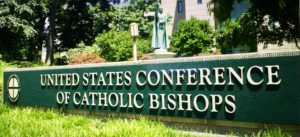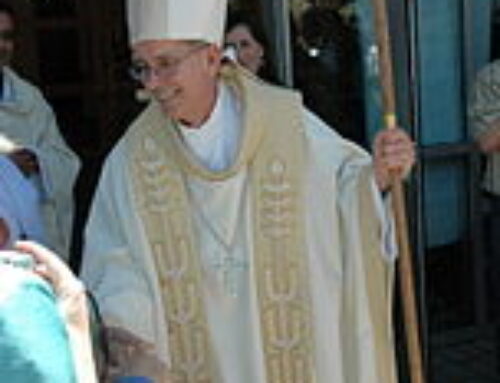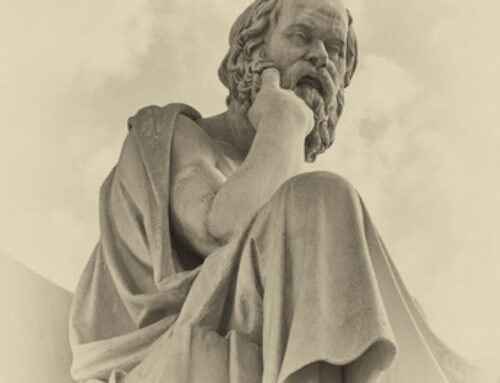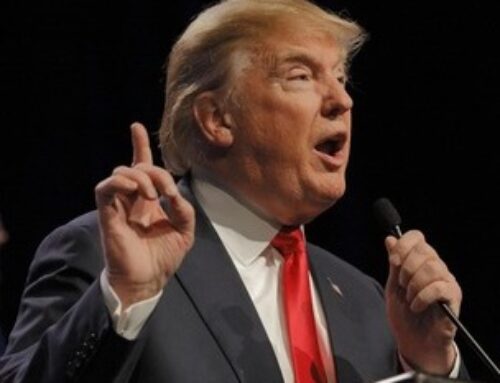 One of G.K. Chesterton’s most profound statements was this: “A thinking man must always attack the strongest thing in his time. For the strongest thing is always too strong.” The insight it offers is as relevant and valuable today as it was when he offered it. If the U.S. Catholic hierarchy, in particular, paid more attention to it, the problems facing clerics and laypeople would be significantly diminished.
One of G.K. Chesterton’s most profound statements was this: “A thinking man must always attack the strongest thing in his time. For the strongest thing is always too strong.” The insight it offers is as relevant and valuable today as it was when he offered it. If the U.S. Catholic hierarchy, in particular, paid more attention to it, the problems facing clerics and laypeople would be significantly diminished.
In recent decades, America’s Catholic bishops have ignored many of the most dangerous matters in our time. As a result, they have failed to provide leadership precisely where leadership is needed or, worse, they have misled Catholics and others about real dangers.
At the outset, let’s be clear that the primary duty of bishops is spiritual—guiding people to understand the Ten Commandments and the Gospel, distinguish good from evil, and follow the path to salvation. However, because people are influenced by society, culture and politics, the bishops’ guidance must be sensitive to those realities as well as to the spiritual ones. And the way they address them is crucial. The right way is to test the strongest things against Scripture and judge accordingly. The wrong way is not to test them at all but instead embrace them without reference to their impact on spirituality.
Often as not, and increasingly of late, bishops have proceeded in that wrong way, supporting the “strongest things” of the age rather than challenging them.
One “strongest thing” has been Liberation Theology, which has been influential since the 1960s. Cardinal Ratzinger (later Pope Benedict XVI) called it a “singular heresy”and a “fundamental threat” to the Church. He characterized it that way because though it is dressed in love of the poor, it emphasizes divisive, socialist concepts such as exploitation of the masses, redistribution of wealth, and the unwarranted destruction of capitalism and democracy. But instead of heeding the Cardinal’s warning, the bishops have continued to embrace liberation theology even after its evil fruits have been well documented.
Another “strongest thing” the bishops should have challenged but didn’t was Humanistic Psychology, a movement also created in the 1960s. One of its former advocates, William Coulson notes that Humanistic Psychology “took behaviors which had for thousands of years been considered destructive to society and reframed them as representing progress . . . such as having sex in as unconstrained and uncivilized a way as possible,” including homosexual practices and pedophilia. The bishops not only accepted Humanistic Psychology as compatible with Christian teachings—which it has never been—they also invited the psychologists to form “encounter groups” in seminaries and convents, a development that led many priests and nuns to lose their vocations and embrace the very lifestyle God chose them to oppose.
Yet another “strongest thing” was the Self-Esteem (SE) movement, an 1980s offshoot of Humanistic Psychology. SE became the focus of K through graduate school education. Its fundamental tenet is that low self-esteem is responsible for failure to achieve in education and in life and is a strong contributor to mental illness. SE advocates advise telling students they are wonderful and brilliant even when their behavior and performance are anything but. They teach that all forms of criticism, including self-criticism, are harmful and must be avoided, a practice that prevents students from identifying their weaknesses and improving. SE implies that belief in original sin and human imperfection is mistaken. Yet few if any Catholic bishops (or pastors) have publicly challenged this false doctrine. In fact, some have given homilies claiming that having high self-esteem is what enables us to love our neighbors, a notion that turns the parable of the Pharisee and the Publican upside down!
Today the “strongest thing” has multiplied to a number of things, and the bishops for the most part are either supporting rather than questioning them or remaining silent about them. Here are eight significant examples:
The progressive movement for “social justice” consists of Marxist-inspired efforts to make government larger and more powerful, redistribute wealth, marry trade unions to political parties, and change charity from a spiritual mandate to a governmental function. (For more details see this.) Taken together these efforts in effect force people to place trust in and serve government rather than God, a violation of the First Commandment—”I am the Lord thy God: thou shall not have strange gods before me.” Yet rather than condemning this Marxist initiative, most bishops have confused it with love of the poor and given it their enthusiastic endorsement.
A radical revision of biological reality has replaced the scientific and biblical concept of gender with more than 58 different imaginary genders, and taken legal measures not only to recognize all of them but to allow even young children to choose the one they “feel” they should be, even to the point of surgical alteration. This makes a mockery of the Judeo-Christian belief that “male and female he created them” (Genesis 5:2), undermines the Fourth Commandment, “Honor thy father and thy mother,” and causes unimaginable psychological harm. Yet few bishops have joined the campaign against this movement, let alone played a leadership role in that campaign.
Mainstream media’s have re-defined “news” as events that support what they want people to believe, and classified all other events as “disinformation.” This intellectually dishonest practice has transformed their news-gathering from truth-seeking to self-promotion. When genuine truth-seekers challenge their slanted and/or false reporting with accurate information, they typically respond by falsely accusing them of racism, homophobia, xenophobia, hate-mongering, and so on. Such wild accusations clearly sin against the Eighth commandment, “Thou shalt not bear false witness against thy neighbor.” Shockingly, rather than calling out and condemning this behavior, bishops often join in it by attacking the truth-seekers with the same defamatory terms used by the media. Even after subsequent events reveal their error, as in the case of their treatment of Donald Trump, they tend to remain silent rather than righting the wrong they perpetuated.
The efforts of large information technology companies (aka Big Tech) to regulate free speech are similar to the media’s redefinition of news. In this case, they censor and/or ban the expression of ideas by those whom they disagree with or disapprove of. These efforts, when successful, prevent the public from learning information necessary to make sound judgments about controversial issues and political candidates. The impact of these efforts is broad and deep. People who have done nothing but express their beliefs in a responsible way are deprived of income and the respect of their communities. Such censorship and banning is manifestly unjust. It is a form of theft and thus a violation of the Seventh Commandment, “Thou shalt not steal.” In this case, as in the other violations of God’s commandments, the bishops have generally remained silent.
Critical Race Theory (CRT) has spread throughout the nation’s elementary and secondary schools and in its colleges and universities. By proclaiming that white people are irreformably oppressive, and people of color are hopelessly oppressed, this theory has spread mutual suspicion, inflamed racial division, and made it difficult if not impossible for young people to learn and practice the virtues of prudence, forgiveness, charitable thinking, and fairness. Preserving these virtues and the social harmony they bring is, of course, a key responsibility of all religious leaders, including Catholic bishops. Yet the bishops response to CRT has been feeble at best.
Parents’ rights over their children’s education are being challenged. When parents have become aware that programs like CRT have been instituted at their children’s schools, they have attempted to determine whether other questionable programs were being offered. In many cases they have been denied such information. The reason given by school officials has been that education is the school’s business and not the parents.’ The parents’ response has been that they have primary responsibility for their children’s education and that this responsibility comes from God. This issue will likely be an important one in deciding the future of parental rights and religious freedom in America. It is hard to imagine how the Fourth Commandment, “Honor thy father and mother,” can be observed if parents’ role in their children’s education is compromised. The strong support of all religious leaders is essential to the preservation of that role, yet Catholic bishops have generally failed to offer that support.
Open borders, sanctuary cities, and the encouragement of illegal immigration continue to undermine the rule of law, contribute to social disruption, and mock the very concepts of justice and fairness offered in their defense. The causes are considered essential to overcoming poverty. Catholic bishops, who were repeatedly taught in the seminary that “the end never justifies the means,” should be leading the attack on that false notion. However, once again, rather than attack the fallacy, they have embraced it and then, even more sadly, raised it to the level of Christian obligation!
Efforts to defund the police, let felons out of jail without completing their sentences, and refuse to prosecute rioters, looters, vandals, arsonists, and even murderers have created chaos around the country. The issue is not just a secular, governmental one but a religious one as well. Indeed, it was a religious issue for millennia, one to which the Fifth, Seventh, and Tenth Commandments directly apply: “Thou shalt not kill”; “Thou shall not steal”; and “Thou shalt not covet thy neighbor’s goods.” It is hard to imagine an issue that would be more appropriate for Catholic bishops to take a firm position on and communicate with vigor. And yet, need I say it again, they remain generally silent.
What have they been doing, singly or as a group, that they consider more important than attacking the strongest things of their time? They have been debating whether Joe Biden should be denied communion for his support of abortion. That is an important matter to be sure, though I would guess Chesterton would be more impressed if the debate concerned excommunicating Biden rather than just denying him communion.
What exactly should we expect of the bishops? How can they regain the trust and respect of tens of thousands of priests, nuns, and lay people? The answer is embarrassingly simple. They can stop playing it safe by offering statements that are little more than tepid versions of mainstream media narratives, and instead boldly attack the “strongest things” of our time—beginning with the ones discussed in this essay—clearly, forcefully, and with a biblical emphasis.
Copyright © 2021 by Vincent Ryan Ruggiero. All rights reserved


